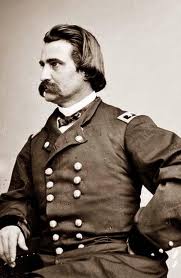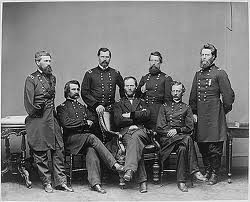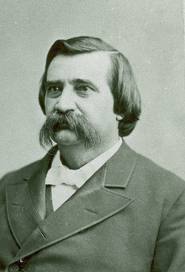 “Black Jack” Logan was considered by many to be a Union hero, but in addition, as a General on Sherman’s staff, was this brave soldier just another political lobbyist? Logan was not a graduate of the Military Academy and became one of the many politically appointed general officers of the Civil War. What sets John A. Logan apart, was his ability to inspire his command and a fearlessness under fire that was second to none. Logan’s was not a newspaper courage, inspired by a hungry press, “Black Jack” was the, real deal, but the military establishment would keep a tight rein on his career, since his prerequisite did not include a formal education at the Military Academy. Most famous United States Generals have been graduates of the Military Academy at West Point. Renowned Generals were groomed for political office, by the press, politicians and captains of industry. These officers were an elite group and for some, it could be a short fall into public oblivion. All, with political aspirations maintained a close relationship to their mentors in Washington and recruited a buffering staff, that could hold their careers in good stead.
“Black Jack” Logan was considered by many to be a Union hero, but in addition, as a General on Sherman’s staff, was this brave soldier just another political lobbyist? Logan was not a graduate of the Military Academy and became one of the many politically appointed general officers of the Civil War. What sets John A. Logan apart, was his ability to inspire his command and a fearlessness under fire that was second to none. Logan’s was not a newspaper courage, inspired by a hungry press, “Black Jack” was the, real deal, but the military establishment would keep a tight rein on his career, since his prerequisite did not include a formal education at the Military Academy. Most famous United States Generals have been graduates of the Military Academy at West Point. Renowned Generals were groomed for political office, by the press, politicians and captains of industry. These officers were an elite group and for some, it could be a short fall into public oblivion. All, with political aspirations maintained a close relationship to their mentors in Washington and recruited a buffering staff, that could hold their careers in good stead.
John A. Logan, was born in 1826, the son of a wealthy southern Illinois physician and an acquaintance of Abraham Lincoln. Young Logan volunteered as a 2nd Lieutenant, in the Mexican War, saw no action, came home, studied the law and soon became enthralled with local Democratic politics. He supported Southern Policy and often blustered from the stump with favorite, Stephen Douglas. As a successful attorney, in his uncle’s office, Logan was elected to the state assembly, as a race-baiting Democrat. He developed an innate ability to change his political affiliation, as public opinion dictated and as the Civil War loomed, he had been elected a Democratic State Representative from southern Illinois. Logan soon morphed his politics into that of a radical Democrat, staunch abolitionist and Lincoln advocate. John A. Logan could definitely determine which way the political winds were blowing.
Legend has it that Logan, as an observer at the First Battle of Bull Run, picked up a discarded Union musket and fired at the advancing Confederates, then assisted in caring for the Union wounded. Logan requested and was granted a commission in the Illinois infantry, seeing his first action at the Battle of Belmont. General Grant lauded Logan’s command ability at Belmont and cited his bravery and meritorious leadership in the Union victory. Attached to McClernand, Oglesby and Grant, the political appointee, led his Illinois Infantry in the victories at Fort Henry and Donelson, wounded twice, Logan stayed to rally his troops and encourage them to victory. John A. Logan was fondly nicknamed “Black Jack” after these battles, due to his swarthy complexion, jet black hair and flowing mustache. General Grant singled out Logan and his Illinois Infantry, in his after battle report stating,
“I particularly mention the names of John A. Logan, 31st Illinois Volunteers (among others), and have no hesitation in fully endorsing them as in every way qualified for the position of brigadier general, and think they have earned the position on the field of battle.”
After recovering in Illinois, from his wounds, Logan rejoined General Grant after the Battle of Shiloh and was promoted to Brigadier General. When Halleck took command and demoted Grant, “Black Jack” went on leave, in order to weather the military and political storm. Upon General Grant’s return, Logan magically reappeared and was again promoted to Major General in command of the 3rd Division of McPherson’s XVII Corps. General Grant knew, that an officer of Logan’s ability and political connections, was too valuable an asset not to be utilized wisely.
During the siege of Vicksburg, “Black Jack” led his men valiantly, ignoring danger and strutting the lines, daring rebel marksmen, encouraging his troops. Rewarding his gallantry, Grant allowed Logan the honor of leading his troopers into the surrendered city and appointed him the temporary military commander. After hostilities in Vicksburg had ceased, Major General John A. Logan requested an extended leave, returning home to Illinois, to recuperate from his battle exertions. “Black Jack” Logan’s increasing notoriety garnered the attention of the press and he declared that the war would be over in 90 days.
 The news traveled quickly and General Grant was infuriated at this type of publicity. When Logan returned to duty, he discovered that the majority of his command had been reassigned and his new posting was with Grant’s right hand man, General William T. Sherman. “Uncle Billy” had little if any political aspirations, but could always employ an officer like “Black Jack”, as long as he could be kept far from the press. Sherman hated reporters more than Grant and both mainly filed reports with Washington, after the fact, rather than before or during a movement or engagement. General Sherman’s staff officers were a heroic group, but a little light in political connections, so Logan was a valued staff addition.
The news traveled quickly and General Grant was infuriated at this type of publicity. When Logan returned to duty, he discovered that the majority of his command had been reassigned and his new posting was with Grant’s right hand man, General William T. Sherman. “Uncle Billy” had little if any political aspirations, but could always employ an officer like “Black Jack”, as long as he could be kept far from the press. Sherman hated reporters more than Grant and both mainly filed reports with Washington, after the fact, rather than before or during a movement or engagement. General Sherman’s staff officers were a heroic group, but a little light in political connections, so Logan was a valued staff addition.
 After Halleck was kicked up stairs and Grant assumed over-all command, General’s Grant and Sherman planned a decisive strategy to end the rebellion. John A. Logan and other political appointees and non-academy officers would play a role, patriotic and brave as they were, their civil aspirations could create major problems when public opinion became involved. Major General “Black Jack” Logan served heroically for Sherman during the Atlanta Campaign, stumped for Lincoln in 1864, returned south in time to lead in the Carolina battles and was eventually assigned as Commander of The Army of the Tennessee and led that army in the Grand Review in Washington, in May of 1865.
After Halleck was kicked up stairs and Grant assumed over-all command, General’s Grant and Sherman planned a decisive strategy to end the rebellion. John A. Logan and other political appointees and non-academy officers would play a role, patriotic and brave as they were, their civil aspirations could create major problems when public opinion became involved. Major General “Black Jack” Logan served heroically for Sherman during the Atlanta Campaign, stumped for Lincoln in 1864, returned south in time to lead in the Carolina battles and was eventually assigned as Commander of The Army of the Tennessee and led that army in the Grand Review in Washington, in May of 1865.
After the war, John A. Logan returned to politics, changed his affiliation to Radical Republican, was elected to the House of Representatives, led the fight to impeach Andrew Johnson, was an advocate of veteran affairs and ran for Vice-President and lost. “Black Jack” Logan was definitely a Union Hero and possibly a Sherman Political Lobbyist.
Bummer


It is usually said that Sherman replaced Logan with O.O. Howard ( a remarkably inept general) because he had doubts about Logan’s administrative abilities. If one reads the diaries and letters of the men of the Army of the Tennessee, another motive becomes clear: Logan was much more popular with the men than Sherman. Uncle Billy would be greeted with polite applause; Black Jack would cause the troops to break out in cheers.
So are you going to write a post on everyone in that picture of Sherman with his generals? Thanks for another post on a figure I knew little about. I’ve heard more about Logan’s postwar political career than his role in the war. Especially how Judge David Davis suddenly was elected to Logan’s Senate seat from Illinois just before he could become the independent voice on the 1877 Presidential Electoral Commission that settled that election.
Louis,
What a great idea, there’s still four to go. The “old guy” is searching for Sherman’s spokesman, as Rawlins was for Grant and Key was for McClellan. Other than brother John in the Senate, “Uncle Billy” had to employ someone on staff to shield his temper and other foibles. Got any ideas?
Bummer